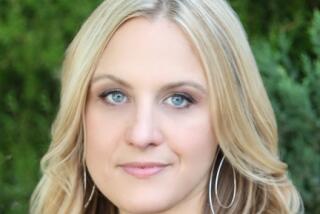Psychology and Religion Explore Hidden Realm of Mind and Spirit : Health: Prejudice relating to mental illness, demonology is being dispelled. Clergy urge professional help for many.
- Share via
They fill houses of worship, but often suffer in silence. At Christmastime, when tens of millions proclaim joy to the world at the birth of Jesus, they become even more invisible in personal prisons of depression.
But the mentally ill may have more reason for hope these days. The barriers that once separated the disciplines of psychology and religion into fields of mutual distrust have come tumbling down.
Age-old prejudices relating mental illness and demonology are being dispelled, and religious groups that once encouraged their members to pray their depression away are training clergy to refer troubled individuals for professional help.
Even the skeptics are being converted. One of the most explosive areas of growth in the mental health field has been in the development of evangelical psychiatric clinics.
“The Church has begun to say: ‘Yeah, we do deserve to have these kinds of units,’ ” said Robert McGee of Rapha, an evangelical corporation providing inpatient psychiatric care. Started in 1986, Rapha cared for nearly 4,000 psychiatric patients in 17 hospitals in 1991.
Within the field of psychology, there are a growing number of studies showing a consistent relation between religion and mental health, said Bernard Spilka, co-author of “The Psychology of Religion: An Empirical Approach.” And common sense also is coming into play.
“In psychoanalytic thinking, religion is an infantile regress to childhood desire,” said Spilka, a psychology professor at the University of Denver. “The only problem with all of this is saying that 90% of the American people are childish.”
Religion and psychology have had a long and sometimes thorny history. Biblical accounts of demon possession indicate people turned to religious healers to treat abnormal behavior; of course, they later burned “witches.”
At times, the church was the only institution that would open its doors to care for the mentally ill, but gradually the government took over the responsibility to provide hospitals for the severely disturbed.
In the early 20th Century, Dr. Sigmund Freud created a revolutionary break by dismissing religion as an infantile attempt to make sense of the world.
Ironically, it was a new attitude of intellectual openness in the 1960s that paved the way for the renewed convergence of religion and psychology.
“That radical rebellious period opened up everything, including the opportunity for that old-time religion to come back,” said Allen Bergin, a psychologist at Brigham Young University.
The changes are visible everywhere today. Both the American Psychiatric Assn. and the American Psychological Assn. have committees interested in religious issues. Lectures relating to religion and mental health are prevalent at the annual meetings of both groups. Even the Society of Biblical Literature has a consultation devoted to psychology and the Bible.
What may have been the death blow to the preeminence of a Freudian view of religion came in 1990 when the American Psychiatric Assn. approved guidelines encouraging psychiatrists to both respect and learn about the religious beliefs of their patients.
Research finds value in the search for God in the lives of individuals.
In a new study conducted by researchers at Southern Illinois University in Carbondale, college students who say religion is important were found to be better able to deal with stress and less likely to be neurotic. In a study by Spilka and Sarah C. Johnson published in the spring 1991 Journal of Religion and Health, a majority of breast cancer patients said religion is an extremely important coping resource.
A study in the December issue of the American Journal of Psychiatry suggests hospitalized elderly men who are religious appear to be less likely to suffer depression.
Having once dismissed a belief in God as infantile, psychologists now in many cases worry more about individuals who are only concerned with themselves.
“A person who is totally preoccupied is really a neurotic individual,” said Dr. David Wulff of Wheaton College, author of “The Psychology of Religion,” a 1991 summary of scientific studies in the field. “Within psychology, there’s a strong basis for arguing that self-transcendence is one of the qualities of a mature individual.”
Once wary that their faith would be devalued in any encounter with psychiatry, religious groups also are seeing the light of increased cooperation.
In the Presbyterian Church (U.S.A.), clergy are told not to perceive themselves as amateur psychiatrists, but to help mentally ill people with their spiritual needs while making professional referrals, said David Zuverink of the denomination’s office of health ministries.
“There’s body, mind and spirit,” Zuverink said. “Our position is that God works through all of these secular and church institutions in an equal way.”
But problems remain.
McGee said many evangelical clergy still preach that solving psychiatric problems is only a matter of increasing personal faith, while others doubt a secular approach to psychiatry.
“I know for sure there is a great deal of distrust among the gatekeepers in the evangelical community to psychiatry,” he said. “We believe for every person we would treat, there are tens of thousands of people out there who are going to churches that really don’t know how to help them with their problems.”
At the same time he is trying to allay the fears of the evangelical community, McGee said, he faces contempt from some mental health professionals who belittle the religiously based effort as a “Sunday school approach” to psychiatry.
“The problem is that a lot of people try to pigeonhole you into a certain category. If you are evangelical, you must be ignorant,” he said.
But others are wary of too intimate a connection between religion and psychiatry.
Dr. Richard Thurrell, head of the Committee on Religion and Psychiatry of the American Psychiatric Assn., said the group is concerned about any attempt by psychiatrists to impose religious beliefs on patients, or hospitals to impose religious tests on psychiatrists.
The Rev. Clark Aist, a chaplain at St. Elizabeth’s Hospital in Washington, said he is concerned some groups may attempt to “Christianize psychiatry.” He worries they may turn the discipline into a method of proselytization or use it to try to make gay people straight.
“In the conversion of psychiatry, they pervert psychiatry,” he said.
In the new detente between religion and psychiatry, it is not always clear where the lines should be drawn.
For example, both McGee and Aist would say someone who is addicted to pornography should not attempt to ignore the addiction and let it fester in the subconscious. But while Aist would say it is a healthy process of self-consciousness to have erotic thoughts about people you are sexually attracted to, McGee said one goal of evangelically oriented therapy would be to encourage the patient to stop looking at pornography.
Any effort to improve the often dysfunctional relationship between religion and psychology is welcome news for many mentally ill and their families.
In a society where expressions such as “demonic” and “possessed” still are used to describe the mentally ill, people suffering from depression and their families often remain silent rather than seek spiritual comfort in their places of worship, according to the Rev. John Cannon.
In one church he visited, the pastor told him he did not know of any members with a mentally ill relative, Cannon recalled in an article in the Journal of Pastoral Care. But after Cannon talked at the church, six families approached him to discuss their mentally ill family members.
“More than anything else,” Cannon said, “they need to feel accepted, understood and cared about by the spiritual community and God.”
More to Read
Sign up for Essential California
The most important California stories and recommendations in your inbox every morning.
You may occasionally receive promotional content from the Los Angeles Times.













